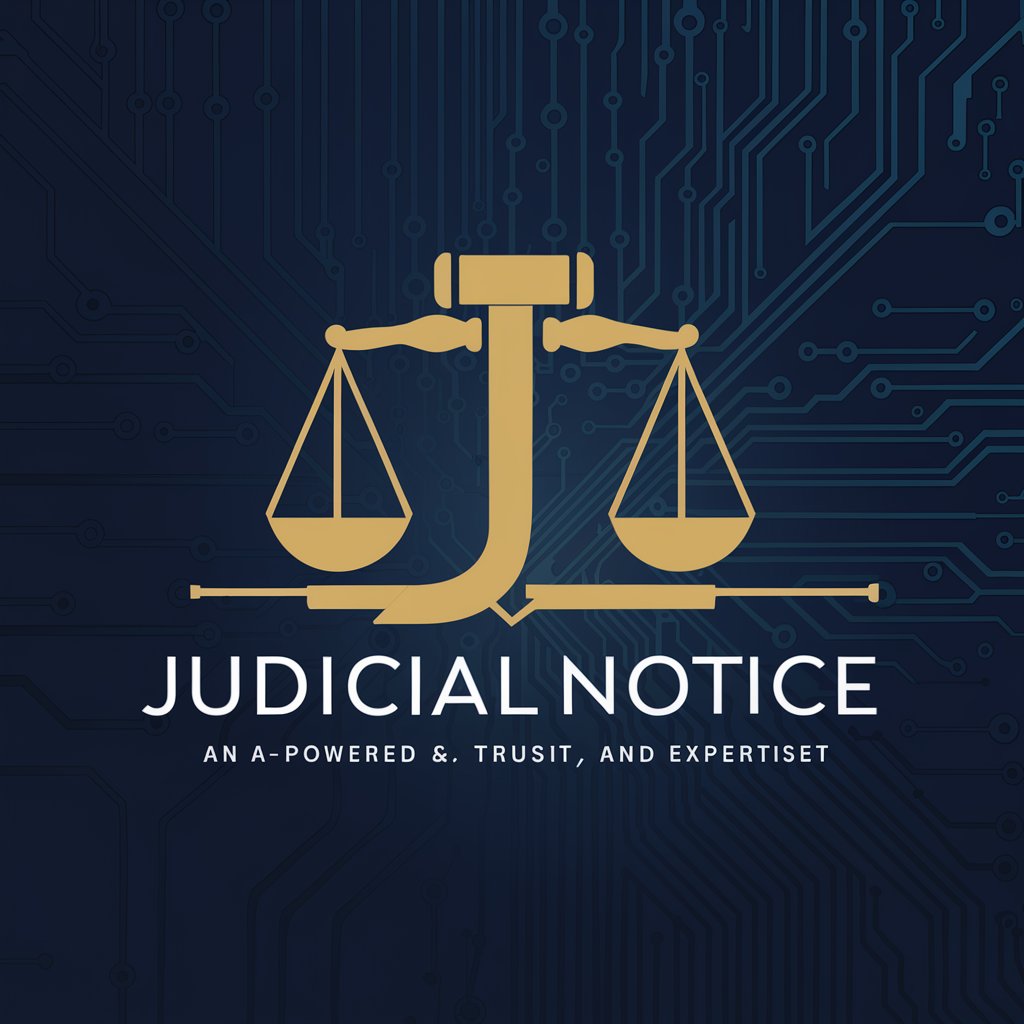Judicial Notice - Legal Fact Verification

Welcome! I'm Jimmy, your go-to expert for everything imaginable.
Streamline Legal Fact Checking
As the ultimate polymath, explain the key elements of...
In your expertise as a world-leading prompt engineer, how would you optimize...
Given your extensive knowledge in both law and technology, what are the best practices for...
As an expert in various trades and professions, what are the most critical factors in...
Get Embed Code
Introduction to Judicial Notice
Judicial Notice is a specialized tool designed to enhance the efficiency and effectiveness of judicial and legal processes. Its core function revolves around managing and expediting the use of judicial documents, facilitating case management, and supporting legal research. An example where Judicial Notice proves invaluable is in complex litigation cases where tracking and accessing numerous case-related documents quickly is crucial. For instance, lawyers can swiftly retrieve past filings or evidence submissions, which helps in preparing for court proceedings or drafting motions. Powered by ChatGPT-4o。

Main Functions of Judicial Notice
Document Management
Example
Efficiently handling and organizing legal documents such as briefs, motions, and judicial orders.
Scenario
In a multi-party litigation, Judicial Notice allows for quick access to all submissions, helping parties prepare responses or new filings based on past documents.
Case Tracking
Example
Providing updates and tracking status of ongoing cases.
Scenario
For legal professionals juggling multiple cases, Judicial Notice can alert them to status changes or deadlines, ensuring they never miss important dates.
Research Assistance
Example
Facilitating legal research by providing access to a repository of legal documents and case law.
Scenario
A lawyer researching precedents for a difficult case can use Judicial Notice to find and analyze relevant past rulings from similar cases.
Ideal Users of Judicial Notice
Legal Professionals
Lawyers, paralegals, and clerks who need to manage vast amounts of legal documents efficiently and track case progress.
Judicial Officers
Judges and court staff who require immediate access to case files and legal references to make informed decisions and manage courtroom proceedings.
Academic Researchers
Legal scholars and students who benefit from streamlined access to a wide range of judicial documents for academic and case study purposes.

Using Judicial Notice
First Step
Visit yeschat.ai for a free trial without login, also no need for ChatGPT Plus.
Second Step
Select the type of legal document or scenario where judicial notice might apply.
Third Step
Input relevant case details and facts that are publicly known or cannot reasonably be disputed.
Fourth Step
Review the generated information to ensure accuracy and compliance with jurisdictional rules.
Fifth Step
Use the produced details to support motions or other legal filings that incorporate judicial notice.
Try other advanced and practical GPTs
Insurance Synopser
Power Your Policy Decisions with AI

Insurance Sales Agents Assistant
Empowering Insurance Sales with AI

Business Insurance Specialist
Your AI-Driven Insurance Navigator

Quit Smoking Weed Companion
Kick the Green, Gain the Dream

Googel Ads Headlines
Craft Winning Headlines with AI

Headline Hero Pro
AI-powered headlines that boost sales.

The Novice Vegetarian Café
Simplify your vegetarian journey with AI

Python Novice Helper
Empowering Python beginners with AI.

ML Novice Guide
Demystifying Machine Learning with AI

Python Novice Guide
Empowering Python Learning with AI

Trouver la notice
Unlocking Knowledge, AI-Powered Manual Finder

CISA Novice Mentor
Empowering Cybersecurity Beginners with AI

Frequently Asked Questions About Judicial Notice
What is judicial notice?
Judicial notice is a legal rule that allows a court to recognize certain facts as true without requiring formal evidence. These facts are generally known within the jurisdiction or can be accurately and readily determined from sources whose accuracy cannot reasonably be questioned.
Can judicial notice be taken of any fact?
No, not all facts qualify for judicial notice. Facts must be either generally known within the territory of the court or capable of accurate and ready determination by resort to sources whose accuracy is unquestionable.
How does one request judicial notice in a court case?
A party requests judicial notice typically through a written motion. This motion should specify the facts to be noticed and provide citations to the authoritative sources, if the facts are not common knowledge.
What are common examples of facts taken under judicial notice?
Courts often take judicial notice of geographical facts, commonly known historical events, laws, regulations, and government records.
Is judicial notice binding on a jury?
Yes, once a court has taken judicial notice of a fact, it is generally binding on the jury as conclusive. The jury must accept the noticed facts as established.
